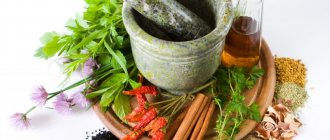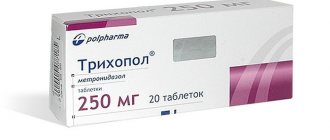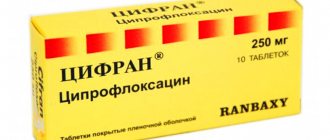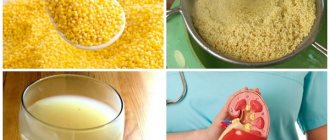Urological collection Fitonephrol for cystitis
Urological collection Phytonephrol for cystitis has a complex effect on the diseased bladder, helping to eliminate pathological processes in it and prevent the spread of inflammation to other organs of the urinary system.
The drug has anti-inflammatory, antimicrobial, antispasmodic, diuretic and restorative effects.
In the fight against cystitis, Fitonephrol can be used both as monotherapy and in combination with other medications.
The medicinal collection Fitonephrol for the treatment of cystitis can be bought at the pharmacy.
Composition and release form
Phytonephrol consists of dry crushed leaves of bearberry and peppermint, calendula flowers, odorous dill fruits, and eleutherococcus rhizomes.
The urological collection is a crushed mixture of medicinal plants interspersed with green, yellow, orange, cream, gray and brown colors. The infusion prepared from the collection has a herbal aroma and a bitter taste.
Phytonephrol is packaged 50 g in moisture-resistant bags and 2 g in disposable filter bags for brewing. The thick paper box contains 1 moisture-resistant bag or 20 filter bags.
Directions for use and doses
Urological collection for cystitis is consumed half an hour before meals in a warm form. Before starting its use, the patient should consult a urologist.
To prepare an infusion from crushed raw materials, use 2 tbsp. l. pour 200 ml of boiling water over the mixture and keep in a water bath for 30 minutes, then cool and strain. The finished decoction is diluted with boiled water, bringing its volume to 200 ml, and taken 1/3 cup three times a day.
To get a cure for cystitis from filter bags, you need to place 2 bags of raw materials in a cup, pour 100 ml of boiling water and leave under the lid for at least a quarter of an hour. After the specified time has passed, the filter bags must be squeezed out and thrown away, and another 100 ml of water must be added to the resulting infusion. You should drink the product 100 ml 3 times a day.
Cooking herbs at home
The components used in the assemblies may differ, but they are often based on the same components. Urological tea or infusion is prepared on the principle of maximum effectiveness for treating the genitourinary system and minimal side effects. The basis of most urological-type preparations are the following herbal ingredients:
- Peppermint leaves. They have a calming effect and help relieve pain.
- Calendula flowers. They have an antiseptic, anti-inflammatory, antibacterial effect. They have a stimulating effect on urination.
- Bearberry. The leaves of this herb contain arbutin, which has a bactericidal effect after splitting. The elements kill pathogenic microorganisms and stimulate the function of the urinary system.
- The fruits of dill. This component helps relieve spasms of smooth muscles, which helps to have a positive effect on the urinary tract. Dill fruits have a diuretic effect.
- Eleutherococcus root. It has a general strengthening, tonic effect on the human body. With normal functioning of the immune system, it will be much easier to cope with infectious pathogens. This component helps stimulate the body's defense mechanisms.
To treat acute and chronic forms of diseases, you can use independently prepared preparations with their further use in the form of decoctions and infusions. Healing plants can be brewed into tea and drunk several hours before bedtime, due to the diuretic components it contains. Homemade preparations, with proper preparation and storage of components, are in no way inferior in their effectiveness to pharmaceutical compositions.
To prepare the collection, known in pharmacies as Urological Collection No. 1, you need to take 20 g of dried plantain leaves, 15 g of horsetail, and cinquefoil roots. Mix all. From the resulting composition, take 1 tbsp. l. collection and pour 2 cups of boiling water. Leave covered for 1 hour. Take the infusion warm, 250 ml before bed.
Urological Collection No. 2 is prepared with a different composition. Birch leaves, bearberry, licorice and corn silk are mixed in equal proportions. Plants are crushed. Then take 4 tbsp. l. mixture and add 2 cups of cold water to its composition and leave for 6 hours. Simmer the mixture for 20 minutes in a water bath. Strain and drink 125 ml three times a day. This tea contains many diuretic components, so it is not recommended to drink it at night.
Urological collection No. 3 is prepared from 50 g of juniper berries, 20 g of parsley seeds, 20 g of birch leaves and lovage. To this composition in the amount of 1 tbsp. l. add 1 glass of cold water, leave for 7 hours. Next, boil the composition for 15 minutes over low heat. Add 50 ml of dry red wine to the prepared decoction and drink 50 ml 4 times a day. The course of treatment is 1 month.
Another collection is prepared from dried rowan and lingonberry fruits (herbs) in a 2:1 ratio. This mixture is brewed in a glass of boiling water. Leave for 5 hours. The filtered composition is taken half a glass 3 times a day. If necessary, you can add honey.
Special instructions for use
The patient may have individual reactions to the components of the composition. In this case, herbal medicine should be stopped immediately and antihistamines should be taken to treat the consequences.
General instructions for using the herbal remedy:
- Medical prescription. The preparations can be purchased at any pharmacy without a prescription. But self-medication can have negative consequences, so do not buy uroseptic drugs unless absolutely necessary. The doctor must accurately diagnose the patient.
- Sedative effect of tea. Keep in mind that most herbs have a calming effect. It is for this reason that it is recommended to drink tea in the evening after work so that you do not feel drowsy during the day.
- Diuretic property. It is to improve the functioning of the urinary system that herbal preparations are prescribed. But don't take the tea right before bed to avoid having to get up to go to the toilet at night.
- Hypertensive effect. Some fees also have the ability to lower blood pressure. If you have hypotension (low blood pressure), you should not take the herbal supplement.
- Dietary supplement. Herbal teas are only part of the treatment. Herbal medicine is indicated to enhance the effect of medications; as an independent use, it can be prescribed only for prevention.
If after taking the drink the patient experiences dizziness, nausea or allergic reactions, then it is worth stopping treatment with the herbal mixture.
Also tell your doctor about side effects so that you can change the drug.
Pregnancy and lactation
Little is known about the effect of the drug on fetal development. However, some active components can cause spontaneous miscarriage or premature birth. Urological herbal teas are contraindicated for women during lactation and pregnancy.
Is it possible for children
Some herbs are widely used in pediatrics as a diuretic. However, due to the high risk of side effects in children, there is an age limit - from 12 years. The recommended threshold is set individually by the manufacturer; you can find out the exact figure in the instructions for use of the collection.
Reviews and recommendations from doctors
The urological collection has firmly taken its niche in the pharmaceutical market. Doctors explain the popularity of phytonephrol both due to its natural composition, affordable price, and effectiveness. The average cost of a medicine is 100 rubles, which may vary slightly depending on the number of packages and weight in the package. When treating with herbal remedies, it should be taken into account that the effect after administration will not be immediate. Therefore, you need to be patient and complete the course.
Monotherapy with kidney tea is carried out only for preventive purposes; in other cases, the doctor prescribes complex treatment, including medication.
Composition of the collection
The main herbs collected are calendula flowers, common dill seeds, Eleutherococcus senticosus rhizome, mint leaves and bearberry leaves.
The majority of the bouquet is occupied by bearberry, more than forty percent of it. Twenty calendula flowers and dill seeds. The rest make up the last ten percent of the lineup. In general, one package of the drug is fifty grams.
How each of the components of the drug works:
- Calendula flowers are considered a good anti-inflammatory and anti-spasmodic solution. They create conditions for the outflow of urine, thereby eliminating the acute inflammatory process;
- Arbutin is part of bearberry, it is an excellent “diuretic” that relieves spasms and inflammation of the urinary tract;
- Mint plays a very important role in the composition. It creates an antimicrobial effect on the body as a whole. This is especially useful during inflammation of the gastrointestinal tract;
- Dill is a herb that soothes the urinary system in general;
- Eleutherococcus strengthens the immune system and creates favorable conditions for normal metabolism.
Storage conditions and periods
The Urological Collection must be stored in the manufacturer's original packaging at an air temperature of no higher than +25 degrees Celsius.
The room should be dry with an acceptable humidity level of no higher than 60%.
The surface of the box with medicinal plants should not be exposed to direct sunlight. The drug should be left in a room that is not accessible to children.
The maximum shelf life of the Urological Collection is 2 years, after which further intake of plant materials is prohibited.
The prepared broth should be stored in the refrigerator, but not longer than 2 days.
Special instructions for use
If you have decided to start treating cystitis using a urological collection, you must adhere to the following recommendations:
- Independent use of the drug is not recommended. Before starting treatment, the doctor must conduct an examination of the body, make an accurate diagnosis and write a prescription;
- Since the drug is a diuretic, it is not recommended to take it immediately before bed. It is recommended to take the last (third) urological collection 2-3 hours before bedtime, so that the bladder has time to empty and the patient can sleep peacefully;
- This remedy is especially effective when used in conjunction with certain medications and procedures. In some cases, to treat cystitis, taking only a urological preparation is sufficient. The drug has proven itself well as a prophylactic agent;
- If any unpleasant symptoms or allergic reactions occur, you should immediately stop taking it and consult a doctor.
In acute forms of the disease, it is recommended to consult a doctor before starting to take the drug, since in some cases the mandatory use of antibiotics is required.
What is prostatitis?
Urological collection for prostatitis is used for any form of the disease. But what is it? Prostatitis is an inflammatory disease of the prostate gland, which is characterized by the following symptoms:
- Frequent urge to urinate, especially at night
- Pain when going to the toilet, discomfort when defecating
- Pain in the pelvis, perineum, lower back
- Painful ejaculation, weakened erection
- Increased body temperature
- Weakness, irritability
The listed signs describe the chronic form of prostatitis. When it worsens, they all become much stronger, and a temperature of 40 degrees, acute urinary retention, and fever are added. If they occur, you must immediately consult a doctor, because at this time, the inflamed tissues may begin to change into tumor tissues or transform into connective tissues (they cannot perform the main functions of the prostate).
For many men, the first symptoms of the disease are practically not noticeable, so it is discovered only at a doctor’s appointment, after undergoing tests, or during an exacerbation.
Factors such as bad habits, poor diet, sedentary lifestyle, and heavy lifting can trigger the onset of the disease. If you always empty your bladder on time or abstain from sexual intercourse for a long time, then the prostate can also become inflamed. Common causes of the disease are:
- Congestion in the pelvis
- Infection in the prostate
- Hormonal disorders
- Decreased immunity
- Inflammatory diseases in neighboring organs
Pathogenic microorganisms can also be transmitted from organs located far from the prostate. For example, in the intestines, some microbes are a normal part of the microflora, but when they enter the prostate they begin an inflammatory process. It is important to consult a doctor as soon as possible in order to stop the phenomenon and prevent bacteria or virus from entering other tissues. Herbal infusions can help the patient with this.
Course of therapy and dosage
An infusion based on this urological collection is taken before meals. Depending on the release form, it is prepared as follows:
- 2 tablespoons of crushed raw materials are poured into 1 glass of warm water, boiled for 15-20 minutes and left for about half an hour. After this, you need to carefully strain and squeeze out the cake. The resulting solution must be brought to a volume of 0.2 l. It is necessary to take only warm, 70-80 ml 3 times a day. The time period should be at least 6-7 hours. The course of treatment ranges from 14 to 30 days, depending on the severity of the disease. The finished infusion is stored in the refrigerator for no more than 48 hours, shake well before use.
- When using filter bags, you need to take 2 pieces and pour 0.5 cup of boiling water. Leave for half an hour. After this, add another 0.5 cup of warm water. Take half a glass three times a day. The duration of treatment is 14-30 days.
It is best to use freshly prepared solutions. If medically indicated, the course can be extended to 60 days (this is carried out only as prescribed by the attending physician).
It is imperative to monitor your drinking regime to avoid dehydration. If the amount of daily urine is less than 50 ml, the installation of a catheter and hospitalization of the patient will be required.
During pregnancy
The ability of Phytonephrol to penetrate the placenta or into breast milk has not been studied to date. Therefore, this drug is not recommended for the treatment of this category of patients. When prescribed by a doctor, therapy is carried out under his strict supervision.
For children
Fitonephrol is not prescribed to children under 12 years of age. For everyone else, the dosage and course of treatment are the same as for adult patients. In order to give a pleasant taste, you can add a little honey to the infusion (if you are not allergic).
Contraindications to taking herbal formulations
Herbs, if taken on their own, can have harmful effects. Any patient may have certain diseases, the impact of which should be taken into account.
Patients with an allergic reaction cannot always use medicinal mixtures. During the course of treatment, a malfunction of the immune system may occur, and the patient’s condition is greatly aggravated.
The urological kit is not recommended for use by patients with cardiac or vascular pathology. Kidney stones are also a contraindication for taking medicinal herbal teas. Sometimes there is a violation of water-salt metabolism, loss of sodium and potassium ions.
The method of using herbal teas and their dosage are selected taking into account individual characteristics. Particular caution should be exercised by pregnant women and children using such medications.
And even if you feel relief after drinking herbal teas, you must definitely visit a doctor and undergo a full examination.
How to use?
You can brew the product in three ways:
- Dial 2 tbsp. l. dry herbs and pour a glass of boiling water. Cover with a lid and leave for 30 minutes. For ease of use, filter the cooled broth and add another glass of water. Before each use, shake the remaining sediment. You can drink this decoction per day, dividing it three times. It is advisable to do this half an hour before meals. The course of treatment for cystitis is no longer than two weeks.
- If you find filter bags on sale, then making healing tea from them is much easier. Place two of these bags in an enamel bowl and pour 100 ml of boiling water. You need to let the broth brew for up to half an hour, but at the end you just need to remove the filters from the cup. Add the same amount of water and divide it three times for oral administration. The bags are used only once; they are not suitable for repeated brewing.
- The same volume of dry grass as in the first option (2 tbsp.) is poured with a glass of hot liquid. Place in a water bath and boil for 30 minutes. Then leave to infuse for another 10 minutes. At the end, filter and add a glass of warm boiled water. The method of application is similar to the previous ones.
What tea helps with inflammation in the bladder?
Green tea is often recommended for cystitis. The composition of the components in green tea has a comprehensive healing effect on the body, eliminates toxins and stops the growth of bacteria. In addition to fighting infection in the bladder, this tea enriches the body with vitamins and microelements and increases defenses. To get the effect you need to drink green tea regularly.
Green tea helps cope with cystitis
Doctors recommend special kidney tea for cystitis; the composition may differ depending on the manufacturer, but the general effect is similar. This tea contains magnesium and iron, cobalt and zinc, potassium and manganese, and fatty acids. This tea contains the cat's whisker plant, or in scientific terms - orthosiphon staminate. In addition to it, the tea box may contain the following herbs: tansy, St. John's wort, lingonberry leaves, sage, etc.
Kidney tea helps to lose weight and is prescribed for gout, edema and cholecystitis. The drink has diuretic properties, flushes the kidneys, and gets rid of excess salt. It’s not difficult to prepare the drink – 3 tbsp. herbal mixture, pour 500 ml of boiling water and leave overnight in a thermos. After straining, the tea is drunk throughout the day before meals. Course – 2-3 weeks.
Watermelon tea is prepared in the summer, during the ripening season of melons. Cut a quarter of the watermelon into pieces with rind, add 1 glass of water and 1 tsp. sugar, bring the mixture to a boil and cook until the crusts are soggy. Remove from the stove, pour in 500 ml of boiling water and 1 tsp. green tea. Leave for half an hour and drink throughout the day instead of water.
Cranberry tea cleanses the body of oxidants. The drink helps against diabetes, liver disease, diarrhea, impaired urination and other pathologies. This tea for cystitis removes bacteria from the bladder and helps against chronic inflammation in the kidneys. You can brew the berries or add cranberry juice to tea.
Description of the drug
“Fitonephrol” is also called urological or kidney tea. This combined herbal remedy is used to treat acute and chronic ailments, as well as to prevent diseases of the genitourinary system. A set of medicinal herbs has a multidirectional effect:
- Antispasmodic,
- Painkiller,
- Antiseptic,
- Diuretic.
Urological collection is carried out in Russia and Ukraine.
Composition and release form
Herbal tea consists of crushed herbs and fruits; sometimes “Fitonephrol” is found in powder form. The collection of yellow-green or dark green color with orange or white splashes is packaged in paper bags from 25 to 100 g, which are packed in a cardboard box.
The composition of the urological collection "Fitonefrol" includes:
- Bearberry leaves (40%) have diuretic properties. The plant contains tannins, organic acids and enzymes that help eliminate spasms and remove pathogenic bacteria from the body.
- Marigold flowers (20%) improve the flow of urine by relieving spasm and inflammation in the kidneys and bladder.
- The fruits of fragrant dill (20%) have diuretic and anti-inflammatory properties.
- Rhizomes and roots of Eleutherococcus (10%) strengthen local immunity and increase the body's resistance to disease.
- Peppermint leaves (10%) have an antiseptic effect and relieve pain.
The components of “phytonephrol” are selected taking into account the interaction and compatibility of medicinal plants.
For reference! Some manufacturers produce teas in filter bags; they are very convenient to brew and drink like tea. Each sachet contains about 2 grams. crushed herbs, one package can contain about 20 pieces.
Indications and contraindications
The medicinal collection is used as part of complex treatment for diseases of the kidneys, bladder and other organs of the genitourinary system in acute and chronic form.
Indications for use are: cystitis, pyelonephritis, urethritis, urolithiasis. "Fitonephrol" is taken to treat prostatitis. Herbal tea monotherapy is indicated for chronic diseases of the urinary organs and for their prevention.
The main contraindication to taking Fitonefrol is an allergy to one of the components. The collection is not allowed to drink by pregnant and lactating women, children under 12 years of age. Treatment with the drug for urolithiasis should be carried out with the permission of a doctor.
Possible side effects
The urological mixture can be used for a long time, since, due to its natural origin, it does not have a toxic effect and does not accumulate in the body. Patients say that phytonephrol is well tolerated. Possible side effects include an allergic reaction and a violation of the water-salt balance, which is explained by the diuretic effect of the collection.
Attention! If such symptoms occur, use of urological tea should be discontinued.
pharmachologic effect
A decoction or infusion of medicinal herbs has the following effects:
- diuretic;
- uroseptic;
- anti-inflammatory;
- antispasmodic.
Arbutin from bearberry (“bear’s ear”) has an antiseptic ability and stimulates urination through mild irritation of the urinary tract mucosa. Flavonoids prevent the proliferation of pathogenic flora, and ursolic acid reduces the inflammatory process.
Calendula contains carotenoids, flavonoids, sitosterol, saponin, mucilage, phytoncides, calendiloside, bitters, arnidiol, faraziol, gentriacontane, essential oil, resins and organic acids. It cleans urine, soothes, relieves inflammation and relaxes smooth muscles.
Calendula cleanses urine, soothes, relieves inflammation and relaxes smooth muscles.
Dill and mint contain phytoncides, stimulate urination, have a general calming effect, and dilate spasmodic ureters and urethra. Mint dissolves oxalates.
Thanks to phenolic compounds and eleutheroside, eleutherococcus roots are slightly diuretic, increase the ability to resist infections, block the inflammatory process, and improve adaptation capabilities.
Use in childhood
Phytonephrol is prescribed for the following urological diseases:
- Acute and chronic cystitis. It is very common among women due to the structural features of the genitourinary system. In this case, the infection penetrates the bladder;
- Urethritis (inflammatory process in the urethra);
- Pyelonephritis (kidney inflammation).
It is important to note that during the period of remission, Fitonephrol can be used as an independent medicine. For exacerbations, it is prescribed in combination with other anti-inflammatory, antibacterial and antispasmodic drugs.
It also shows its effectiveness for the prevention of chronic cystitis or pyelonephritis. A high therapeutic effect is achieved if taken at the first unpleasant symptoms.
For cystitis, urologists prescribe Fitonephrol:
- for the treatment of acute and chronic inflammatory processes in the bladder;
- to prevent exacerbations of the disease.
To prepare an infusion from crushed raw materials, use 2 tbsp. l. pour 200 ml of boiling water over the mixture and keep in a water bath for 30 minutes, then cool and strain. The finished decoction is diluted with boiled water, bringing its volume to 200 ml, and taken 1/3 cup three times a day.
To get a cure for cystitis from filter bags, you need to place 2 bags of raw materials in a cup, pour 100 ml of boiling water and leave under the lid for at least a quarter of an hour. After the specified time has passed, the filter bags must be squeezed out and thrown away, and another 100 ml of water must be added to the resulting infusion. You should drink the product 100 ml 3 times a day.
To properly prepare the medicine, you need to follow the instructions for use that come with the package. The medicinal mixture is brewed or prepared in a water bath and taken orally. It is recommended to drink up to 100 ml per day. decoction
To prepare a urological collection in powder form, you need 2 tablespoons of the product, which are brewed into 200 ml. boiling water The broth is infused for up to half an hour, then filtered and diluted with another 200 ml. water. The dosage regimen remains the same. The duration of treatment is 2 weeks.
For reference! Doctors do not recommend storing the prepared broth for a long time; it is better to prepare fresh daily.
2 bags need to be poured with a glass of boiling water and left for half an hour, after which they are taken out, soaked and thrown away. The decoction itself should be drunk three times a day warm, half a glass, preferably 30 minutes before meals. If you want, you can add sugar or honey to taste to make it more palatable.
Even if the symptoms of the disease have passed, and the course of treatment has been prescribed for a long time, it is better to continue drinking the decoction to consolidate the results and strengthen your immunity.
It will not have a negative effect on the body, on the contrary, it will strengthen it and have a positive effect on the general condition. The drug can also be used by children. Despite the fact that pregnancy is a contraindication, it is often prescribed to expectant mothers if they experience severe swelling.
It is recommended to take phytonephrol orally, after brewing it. Each type of product requires its own method of use.
Recommendations:
- a urological collection for the treatment of cystitis and other ailments of the excretory system is brewed as follows: place two tablespoons of the raw material in an enamel container, pour a glass of boiling water. Close the container with a lid, wait half an hour;
- Before using the medicinal collection, strain the medicine, squeeze out the remainder, add another 200 ml. Shake the product before taking it.
Admission rules:
- Place two sachets in a jar, add 100 ml, wait half an hour;
- then take out the bags and add the same amount of liquid.
The course of therapy in this case lasts no more than one month. Take 100 ml of decoction three times a day 20 minutes before meals. The dosage is indicated by the physician, taking into account the patient’s condition and the course of the disease.
Cystitis disease
Cystitis belongs to the group of diseases of the urinary system. Damage to a specific area or the entire wall of the bladder is typical.
This inflammation is accompanied by specific symptoms that simplify diagnosis and do not require expensive examinations.
Manifestations of cystitis:
- Frequent urination.
- Pain and burning when urinating.
- Hematuria.
- Pyuria.
- Urinary incontinence (more common in women over 40 years of age).
Disorders of the urinary system are associated with the fact that the inflamed mucous membrane becomes extremely sensitive to urine components and the presence in the bladder cavity.
As a result of this, pain appears and the functional volume of the organ decreases.
In some patients, with extensive inflammation, the amount of urination reaches several dozen times in one hour. At the same time, the volume of urine excreted may not exceed 20-30 ml.
Such phenomena cause irritation of the skin of the external genitalia and pustular lesions, which aggravates the condition.
Along with disorders of the urogenital complex, general reactive processes of the body are observed, caused by the presence of bacteria and a source of inflammation in the body.
They manifest themselves in the form of an increase in body temperature to 39˚C, deterioration in health, sweating and body aches. The intensity of symptoms is higher in the first hours and days of illness, after which cystitis can become subacute.
What not to do with cystitis
In the acute phase of the disease, the patient should give up a number of products that irritate the mucous membrane of the bladder, causing the spread and aggravation of the pathology.
Thus, the patient is strictly prohibited from drinking the following drinks:
- Citrus juices. Despite the fact that the vitamin C they contain is extremely beneficial for the body in case of any bacterial disease, you should avoid such juices. This is due to the presence of acids in them, which change the pH of urine. Increased acidity of urine leads to damage to the deep layers of the urinary wall and increases the risk of developing ulcerative inflammation.
- Alcohol. Alcohol breakdown products are excreted by the kidneys; alcohol has a depressing effect on the immune system, prolonging the treatment period.
- Carbonated drinks. The carbon dioxide they contain is converted into carbon dioxide in the human body. The further mechanism of action is identical to that of citrus juices.
- Strong tea. Some substances contained in black tea have a tanning effect on fabrics. This process makes treatment more difficult because it is more difficult for drugs to penetrate into the tissues where the bacteria are located. It is better to exclude black tea and drink green tea.
Some types of tea are used to relieve the symptoms of cystitis, which is used by patients suffering from chronic inflammation of the bladder.
Such patients more often resort to treatment with alternative means of treatment, or are treated at home.
Indications for use
Urological collection is a plant material with pronounced therapeutic properties, with the help of which a water decoction is prepared for dosed consumption.
chronic or acute urethritis, accompanied by a burning sensation when urinating, redness of the urinary canal and other disturbances in the outflow of urine; inflammatory processes in the tissues of the prostate gland in men of all age groups (with the help of a urological collection, prostatitis of bacterial and cold etiology is successfully treated); cystitis of infectious origin; chronic or unspecified nephritis without signs of functional impairment of the kidneys; urolithiasis (if this diagnosis is present, urological collection is prescribed with extreme caution, since there is a risk of stones moving through the excretory canals, blocking the outflow of urine); urethral syndrome.
Urological collection is equally effective for treating men and women. For severe diseases of the genitourinary system, the drug is used only in combination with potent medications with an antibacterial and anti-inflammatory spectrum of action.
Patients with urolithiasis must undergo ultrasound diagnostics of the kidneys. Before prescribing the drug, the urologist assesses the risk of large stones being washed out with further blockage of the urinary canals. If there is a real danger of blocking the outflow of urine, then taking the Urological Collection is contraindicated.
The main therapeutic effect of the urological collection is based on its following pharmacological properties:
- has a pronounced anti-inflammatory effect;
- removes signs of swelling of the mucous membrane of the urinary canal;
- has an antispasmodic effect, ensuring the free outflow of urine (this property of the drug is especially in demand among patients with exacerbation of chronic prostatitis);
- eliminates burning, redness and pain inside the urethra, which most often intensifies during urination;
- acts as a local tonic, increasing the protective function of the immune system;
- is a natural antimicrobial agent, suppressing the pathogenic activity of pathogenic microflora.
Urological collection for women and men is a natural therapeutic remedy that also has a strong diuretic effect. This drug not only eliminates signs of inflammation, spasm and swelling of the urethral mucosa, but also flushes out infectious microorganisms from the genitourinary system.
The concept of etiotropic, pathogenetic and symptomatic treatment
Treatment of cystitis has 3 main goals:
- 1 Eliminate the cause that led to the disease (etiotropic therapy).
- 2 Eliminate changes already caused by the disease, prevent the occurrence of new ones (pathogenetic therapy).
- 3 Alleviate the patient’s condition (symptomatic treatment).
1.1. Antibiotics
Etiotropic therapy is aimed at destroying the pathogen. The criteria for its effectiveness are the absence of a uropathogenic microorganism in the urine, as well as the normalization of other laboratory parameters and an improvement in general well-being.
The exception is those patients whose urinary tract is not completely sanitized (diabetes mellitus, bedridden patients with a long-term installed urinary catheter, and so on).
According to the recommendations of the European Association of Urology, the basis of etiotropic therapy is antibiotics, which are prescribed immediately after verification of the diagnosis: first empirically, then, if necessary, in accordance with the results of urine culture.
When choosing an antibiotic, the doctor pays attention to such aspects as:
- 1 age (child, adult, elderly);
- 2pregnancy or breastfeeding;
- 3presence of concomitant pathology;
- 4 the presence of allergies and individual intolerances;
- 5what medications the patient is already taking, will they be compatible with the antibiotic;
- 6were these drugs used in treatment, if “yes”, then which ones;
- 7 resistance of flora to antibacterial drugs in this region.
Treatment of uncomplicated cystitis is carried out on an outpatient basis for approximately 1.5-2 weeks. As a rule, drugs are prescribed in the form of tablets, less often they are administered by injection. The drugs of choice are fosfomycin, nitrofurantoin, and cephalosporins. Fluoroquinolones (ciprofloxacin, norfloxacin, etc.), protected aminopenicillins are alternative. This is due to the increasing resistance of microorganisms to drugs of these groups.
In pregnant women, UTIs are treated with protected aminopenicillins, II and III generation cephalosporins, and fosfomycin. For health reasons, antibiotics of the aminoglycoside group are occasionally prescribed. Tetracycline and sulfonamide drugs and fluoroquinolones are contraindicated.
In older people, UTIs often occur against the background of existing other diseases, for example, diabetes mellitus, atherosclerosis of the renal arteries, etc. Therefore, antibacterial agents are selected taking into account the presence/absence of renal failure and its severity.
In pediatric practice, drug doses are calculated depending on the age and weight of the child. Protected aminopenicillins and cephalosporins are usually prescribed.
Complicated cystitis and pyelonephritis are treated in a hospital. Antibiotics are prescribed intramuscularly or intravenously. As the patient's condition improves, the patient is transferred to oral antimicrobial drugs.
1.2. Pathogenetic therapy
In the pathogenesis of upper and lower urinary tract infections, many factors play an important role that must be taken into account to increase the effectiveness of therapy.
- The ability of bacteria to attach to the cells of the mucous membrane lining the urinary tract. For example, “P-villi” were found in E. coli, which is a common causative agent of cystitis.
By attaching to the surface of epithelial cells with their help, E. coli can be held for a long time and climb up the “ladder”.
This partly explains the fact that E. coli is one of the most common causes of UTIs. According to some studies, the presence of these villi reduces the effect of taking medications by 50%. Currently, vaccines are being developed that take this factor into account.
- Reverse urine flow (retrograde).
The presence of urine reflux ensures the spread of microorganisms, including those that lack “P-villi” and have a fairly low level of pathogenicity. Elimination of retrograde urine flow promotes a speedy recovery and prevents recurrent cases of the disease.
- Dysbiosis of mucous membranes. Microorganisms on the surface of the mucous membranes form so-called biofilms, which prevent the attachment and reproduction of pathogenic bacteria, viruses, fungi, etc. With dysbiosis, the likelihood of cystitis increases significantly, and recovery occurs later. Part of the predisposition of patients to the disease is due to a decrease in the ability of lactobacilli to attach to mucosal cells.
- Sexual intercourse, use of the diaphragm.
- Retention of urine and stool.
- Impaired urine flow. Congenital narrowing of the ureters, tumors, structural abnormalities, and urolithiasis also contribute to relapse.
- Diseases that reduce the body's defenses. Diabetes mellitus, primary and secondary immunodeficiency states, severe infectious diseases are also additional risk factors that worsen the course of the disease. Treatment of urinary tract infections in such patients is more successful if remission of the underlying disease can be achieved.
The links of pathogenesis are indirectly influenced by a healthy lifestyle, sanatorium treatment and physiotherapeutic procedures that improve blood circulation and strengthen local and general immunity.
1.3. Eliminating symptoms
The goal of symptomatic therapy is to eliminate or mitigate the symptoms of the disease that cause suffering or discomfort to the patient. This, for example, is taking antipyretics for elevated temperatures, painkillers and antispasmodics for painful urination, etc.
Herbal preparations and herbs, the use of which we will consider below, relate to auxiliary pathogenetic and symptomatic therapy of cystitis in women and men. They cannot be basic.
Varieties of kidney tea
Kidney tea, sold in pharmacies, consists only of natural herbal ingredients. The main, and sometimes the only, component is the leaves of the orthosiphon staminate. The composition may also contain lilac flowers, cuttings, fruits and roots. This option will contain more flavonoids, saponins and various essential oils.
Today, the choice of kidney teas is quite wide, but not all of them are approved for use during pregnancy.
The most common types are:
Kidney tea, or stamen orthosiphon. This variety is most often prescribed to pregnant women. The plant is safe for the health of the woman and the unborn child and does not affect the gestation process. Experts recognize this kidney tea as an effective remedy for eliminating physiological edema.
It is important to prepare the drink correctly and follow the dosage, then the risk of side effects will be almost zero. Orthosiphon stamen can be used at any stage of pregnancy
It helps not only with edema, but also with inflammatory diseases of the urinary system. Reviews of kidney tea consumed during pregnancy are positive. Women talk not only about the elimination of edema, but also about an improvement in their overall well-being after the course of treatment.
Herbal tea with lingonberries. The action is similar to Orthosiphon stamen: diuretic, anti-inflammatory. This option is essentially a herbal collection. In addition to lingonberry leaves, there may be knotweed grass, chamomile flowers, and rose hips. The multicomponent composition makes the tea more effective, but when prescribing it, one must take into account the higher risk of allergic reactions. The main difference between the two teas is that orthosiphon stamen is used to treat urolithiasis and relieve spasms, and lingonberry is used to eliminate inflammatory processes in the urinary tract.
Herbal tea with bearberry. This collection helps with diseases of the bladder and urinary tract. Has bactericidal and antiseptic properties. However, this plant has side effects that are dangerous during pregnancy: increased blood pressure, uterine tone, nausea and vomiting. Therefore, you can take herbal teas with bearberry only as prescribed by a doctor.
Herbal tea with birch leaves and buds. It has a diuretic and anti-inflammatory effect, and is a source of vitamin C. It is also known that tea based on birch leaves has a calming effect, which is important for expectant mothers.
Conditions for dispensing from pharmacies
Over-the-counter product.
A mixture of herbs is used in conjunction with antispasmodics, antibacterial agents and other drugs for the treatment of inflammatory diseases of the urinary tract.
Other ready fees
In addition to Fitonefrol, there are similar products available in pharmacies in every city:
- Leros urological - consists of bearberry and birch leaves, parsley root and ox grass, nettle, yarrow, knotweed and elderberry flowers. Brew it with 250 ml of hot water per bag. Can be used up to five times a day.
- Altai collection No. 28 - contains rose hips and dill, licorice roots, horsetail, flax seeds, birch and lingonberry leaves. For one bag of dry herbs, 200 ml of boiling water is enough. You only need to infuse it for 15 minutes, then add more warm water to the initial volume and drink three times a day. The course of treatment lasts a month.
- Herbal tea "Kidney" - consists of knotweed, shoots of horsetail, plantain, shepherd's bag, peppermint leaves, corn silk and columns, black elderberry and white acacia flowers, wheatgrass roots, dandelion and burdock, and chamomile. This composition has a beneficial effect on the entire genitourinary system and helps eliminate pathogenic bacteria from the urinary tract.
For pyelonephritis
Kidney inflammation is a very painful and unpleasant disease. It can manifest itself in acute or chronic form in men and women. The urological collection Phytonephrol has proven its effectiveness in the fight against this disease; the method of administration does not differ from the cases described above. The following fees can also be used:
- Mix hernia glaucoma, field steelhead, parsley and bearberry leaves. The components are mixed in equal proportions, then you need to pour boiling water over them and leave for 2 hours. You should drink no more than 1 glass per day, which should be divided into several servings.
- Mix lingonberry leaves, celandine, parsley, bearberry. One spoon of the mixture is poured with 400 ml of boiling water for 40 minutes. Drink urological infusion 100 ml 3 times a day.
- To collect you will need nettle, horsetail, lingonberry leaves, motherwort, hops, violet flowers, string. Pour hot water over the herbs and place in a water bath for 30 minutes. Drink the urological remedy in small portions (about 100 ml) three times a day.
Leros
A well-known company producing herbal infusions is Leros. The manufacturer also suggests that patients purchase herbs with a diuretic effect. Before using Leros, please read the instructions for use carefully.
Thanks to the action of the plant components included in the preparation, the uroseptic collection has a disinfectant, antibacterial, and anti-inflammatory effect. It also has antispasmodic properties. You can buy a package of tea from 80 rubles.
Compound
Leros tea is a mixture of crushed plant materials with a rich, pleasant aroma. The package contains 20 tea bags. The drug is not available in the form of a loose collection.
The composition contains the following ingredients:
- birch leaves;
- bearberry leaves;
- knotweed grass;
- parsley root;
- steelweed root;
- nettle leaves;
- yarrow;
- elder flowers.
The medicinal supplement can be used for preventive purposes. The drug reduces the focus of inflammation in the pelvic organs, accelerates metabolism due to its strong diuretic effect.
Indications
The list of indications for use includes diseases of the genitourinary system. Urological collection is prescribed for men with prostatitis, used as an additional treatment for urethritis, cystitis and other inflammatory processes.
The collection has an anti-inflammatory effect, helps the kidneys work in case of kidney failure, and copes with the removal of sand from the body in case of urolithiasis. Can be prescribed as a preventative measure for chronic diseases.
Like Fitonefrol, Leros uroseptic tea is not officially considered a medicine. This is a biologically active food supplement.
How to use
Preparation of the drug does not differ from the method of brewing regular bagged tea. Infusion time is 10-15 minutes. To prepare a decoction of greater concentration, you can take 2 sachets per glass of water.
Apply the product 3 to 5 times a day, when using a strong infusion - 1-2 times. It is also recommended to add a little baking soda to the solution on the tip of a knife to improve the diuretic effect. Duration of treatment is 1-2 weeks.
Video on the topic
Video review of Phytocollection for cystitis - one of the analogues of Fitonefrol:
Clinical studies show that the drug is an effective treatment for cystitis, prostatitis, and other diseases of the urinary system and kidneys. It has a therapeutic effect and can significantly prolong the period of remission. According to experts, urological collection is a good alternative to dispensary observation for chronic inflammatory diseases of the urinary system.
Indications for use
Despite its natural composition, Fitonefrol still has a number of contraindications:
- During pregnancy and breastfeeding;
- children under 12 years of age;
- severe dysfunction of the liver and kidneys;
- intolerance to one of the components;
- urolithiasis disease.
It is also prescribed with caution to patients prone to swelling or problems with the cardiovascular system. Before starting treatment, you must consult your doctor
People suffering from:
- hypersensitivity to its plant components;
- edema caused by renal or heart failure.
Phytonephrol is used to treat the following ailments:
- the drug is used as an adjuvant therapy for diseases of the excretory system (cystitis, urethritis, pyelonephritis, urolithiasis). The drug is effective against diseases occurring in chronic or acute form, for the prevention of relapses;
- urological collection is indicated for prostatitis of any severity. As a main remedy, Fitonephrol is prescribed for the treatment of chronic prostatitis or the prevention of relapse.
Note! Many ladies prefer to use Fitonephrol as a means of losing weight. The diuretic effect helps remove excess fluid from the body and reduce weight
The effect of the drug ends after its discontinuation, because Fitonephrol does not affect the fat layer in any way.
You can avoid any negative consequences by adhering to the dosage prescribed by your doctor.
Phytonephrol is not recommended for use in some cases:
the patient is allergic to certain components of the medication; Take special care when taking medication if you have cardiovascular diseases or serious kidney pathologies; It is not recommended to take Fitonephrol for pregnant women or those who are breastfeeding; the medicinal product is prohibited for use by children under twelve years of age; urolithiasis should be treated with Fitonephrol only under the supervision of a doctor. In some cases, the strong diuretic effect can harm the patient.
Contraindications
The instructions for the drug indicate in which cases its use is not allowed. These include:
- allergic reactions or intolerance to some components of the collection;
- pregnancy and breastfeeding;
- the patient's age is less than 12 years.
If the patient has been diagnosed with urolithiasis, you should consult a urologist before starting treatment. The collection is not recommended for patients with cardiovascular insufficiency.
The combined use of Phytonephrol, which includes bearberry, with medications that cause acidification of urine is strictly prohibited.










